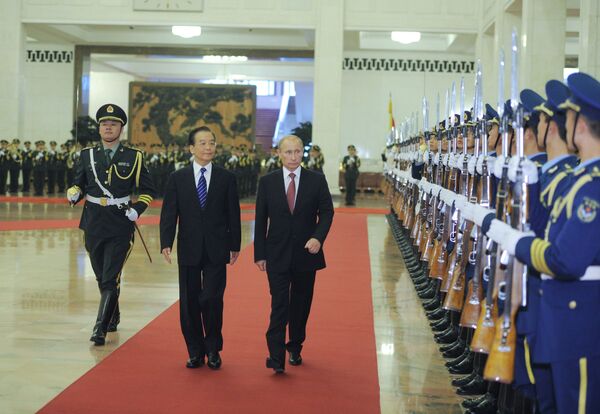New energy deals are not the only result of Russian Prime Minister Vladimir Putin’s latest trip to China. During his two-day visit, he also forged a high technology and economic modernization alliance with Beijing.
In a joint press conference following talks with Chinese officials, Putin said the sides intend to cooperate in high-tech sectors such as aircraft manufacturing, nanotechnology, biotechnology, computer science, and medicine.
This new and long-awaited trend marks an important political as well as economic achievement in Russian-Chinese relations.
Price formula
Ahead of Putin’s visit to Beijing, it seemed unlikely that the latest round of negotiations on long-term supplies of Russian natural gas to China would yield any positive results. So the prime minister’s words that the two countries “are nearing the finish line” in the gas talks came as a pleasant surprise. So, too, did the new deal to pump crude oil from Skovorodino southward. The pipeline’s Russian operator, Transneft, even decided to terminate its initial contract with China and file a suit with the London Court of Arbitration after the Chinese side tried to unilaterally “modify” the contractual price, bringing it down.
The pricing of Russian natural gas supplies to China has been an issue for some three decades now. But it was not the sides’ unwillingness to meet each other halfway that held the talks back for so long.
This “halfway” tactics helped the sides reach a deal on the demarcation of the Amur River. The Amur would have been the world’s only border river where one country possessed the territory along one bank as well as the entire water area. The normal practice is to divide border rivers down the middle. Russia and China did just that six years ago, thereby resolving this and other long-standing territorial disputes.
Energy supplies are a much more complicated issue to negotiate. Unofficial reports about the gas pricing dispute between Moscow and Beijing mention the $250-$350 price range for 1,000 cubic meters of gas. The Chinese are renowned for their haggling skills, but making them meet somewhere in the middle should not be too big a challenge for Russian negotiators in theory. Not in this case, though. We are talking about a thirty-year contract for the supply of some 68 billion cubic meters of gas per year (30 billion cubic meters along the western route, to be pumped starting in 2015, and another 38 billion cubic meters to be sent along the eastern route). This size of the energy deal is unprecedented. Small wonder, then, that the Russian-Chinese gas talks have been dragging on for five years now.
But how can a price formula be developed for the next 30 years? China could create one by factoring in the price of the gas it buys from Turkmenistan and elsewhere, Moscow’s gas price for European consumers, the prices of liquefied gas, and Europe’s declared intention to overcome its dependence on Russian supplies. But all these things are hardly predictable during a financial crisis, when the rates of the two major world currencies just one year from now are anyone’s guess. So maybe China should calculate the price in rice bags instead?
Both Moscow and Beijing share the philosophy of global energy stability, whose main idea is to make fuel prices independent of market volatility and to settle on a strategy for steady and predictable supplies.
Russia made this the main focus of the G8 summit it hosted in St. Petersburg in 2006. The delegates signed a declaration to this effect and then promptly forgot all about it. China’s approach is different, though.
It’s a good idea in principle, but how it could work in practice is hard to say.
Realities of modernization
Among numerous economic agreements signed during the latest round of Russian-Chinese talks in Beijing, it is the Memorandum on Cooperation in Modernization that stands out. It brings bilateral economic cooperation to the level of global politics, which is good news.
Moscow has made some noticeable progress in its efforts to redress the “colonial” trade imbalances with its No. 1 economic partner (according to Putin, bilateral trade this year is likely to hit the $70 billion mark). At this point, commodities remain the mainstay of Russia’s exports to China, while most of the imported Chinese goods are high-tech products, including electronic gadgets and cars. Russia will now try to balance this out by modernizing its economy with China’s help. And this decision is about politics as much as economics.
I think it would be appropriate to cite here an excerpt from my article on the BRICS summit held in China last April. In it I focused on economic modernization, the key theme of Dmitry Medvedev’s presidency.
“If we are talking about Russia’s politics vis-à-vis the West – that is, the EU and the United States – the goal behind the modernization alliance offered to them by Moscow is obviously a political one… Moscow proposes working together to upgrade the Russian economy, arguing that its technological modernization will be inevitably followed by modernization in politics (not vice versa)…
“Russian liberals, who have lots of delusions about foreign politics, have detected a host of overtones into this simple alliance formula. As they see it, the idea behind it is for Moscow to intimidate oriental despots by turning westward, where the modernization resources are concentrated.
“It would seem strange, however, to make such a U-turn now that the West itself is turning eastward, and it is becoming increasingly clear that modernization potential and many other resources are shifting to emerging markets.”
As we can see, the economic particulars of Russia’s cooperation with China are not entirely positive, but they may well benefit Russia’s modernization bid.
The views expressed in this article are the author’s and may not necessarily represent those of RIA Novosti



